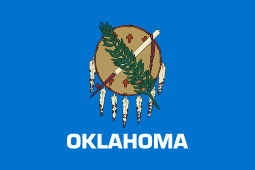Oklahoma Pardon and Parole Board
| Agency overview | |
|---|---|
| Formed | July 11, 1944 |
| Headquarters | Oklahoma City, Oklahoma |
| Employees |
30 classified 3 unclassified |
| Annual budget | $2,466,681 (FY-2016) |
| Ministers responsible |
|
| Agency executive |
|
| Website | www.ppb.ok.gov |
The Oklahoma Pardon and Parole Board is the parole board of the state of Oklahoma. The Board was created by an amendment to the Oklahoma Constitution in 1944. The Board has the authority to empower the Governor of Oklahoma to grant pardons, paroles, and commutations to people convicted of offenses against the state of Oklahoma.
The Board meets each month at one of the State penal institutions.
Mission statement
The mission of the Pardon and Parole Board as a vital part of the criminal justice system is to determine the best possible decision, through a case-by-case investigative process and to protect the public while recommending the supervised released of adult felons. Although, in recent years the Board has been mandated to assist with alleviating prison overcrowding, it remains our goal to maintain a low revocation & recidivism rate for the State of Oklahoma.
Composition
The Board is composed of five appointive members. Three are appointed by the Governor of Oklahoma, one by the Chief Justice of the Oklahoma Supreme Court, and one by the Presiding Judge of the Oklahoma Court of Criminal Appeals. They serve four year terms that run concurrent with the term of the Governor.
Any member of the board that is a licensed attorney is prohibited from representing in any Oklahoma court any persons charged with felony offenses.
Board Membership
- Vanessa Price - Chair
- Patricia High - Vice Chair
- Robert Macy - Member
- Thomas Gillert - Member
- Vacant - Supreme Court Appointee
Powers and Responsibilities
The Constitution grants the Governor the power to grant commutations, pardons and paroles for all offenses against the State upon such conditions and with such restrictions and limitations as he may deem appropriate. However, the Governor can not exercise these powers unless he submits the name of the individual to the Board. The Board will then review the applicant for clemency. The Board is responsible for making an impartial investigation and study of applicants for clemency.
If a majority of the Board votes in favor of the clemency, the Governor is empowered to make such acts of clemency for the individual as he deems necessary. However, the Board has no authority to make recommendations regarding parole for convicts sentenced to death or sentenced to life imprisonment without parole. However, the Board may recommend commutations and pardons for such offenses. The Board's authority, however, can not limit the Governor's power to grant, after conviction, reprieves, or leaves of absence not to exceed sixty days without the consent of the Board.
